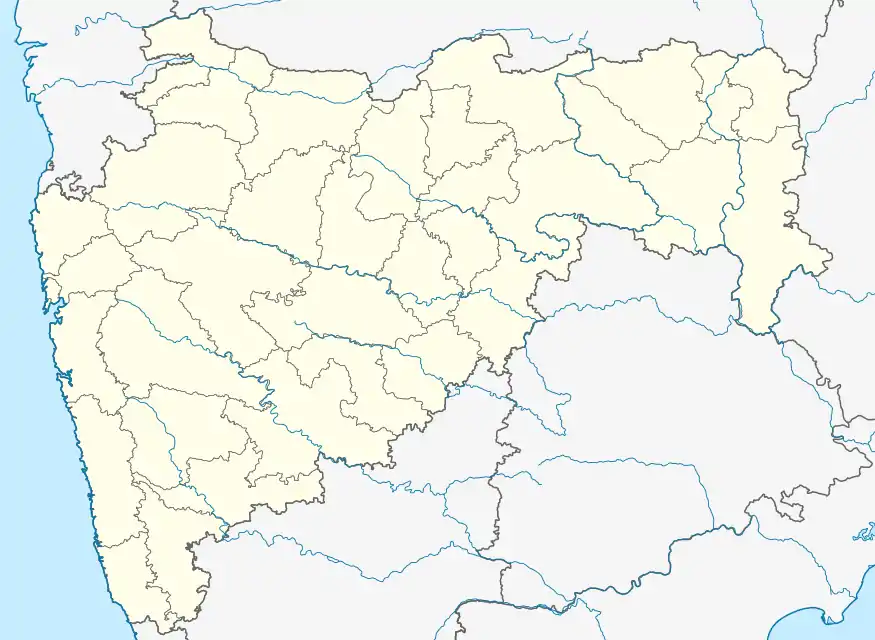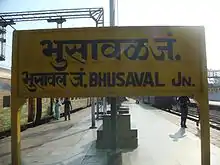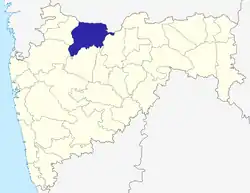Bhusawal
Bhusawal also spelled as Bhusaval is a city as well as a municipal council (established in 1882) in the Jalgaon district in the Indian state of Maharashtra.[2] Bhusawal is the largest Taluka in the Jalgaon district, the city is divided into 47 wards and area covered under the city is 13.38 sq. km.
Bhusawal
Bhusaval | |
|---|---|
Semi Urban | |
 Bhusawal Location in Maharashtra, India | |
| Coordinates: 21.05°N 75.77°E | |
| Country | |
| State | Maharashtra |
| District | Jalgaon |
| Government | |
| • Type | Municipal Council |
| • Body | Municipality |
| • Mayor | Raman Bhole[1] |
| Area | |
| • Total | 13.38 km2 (5.17 sq mi) |
| Elevation | 209 m (686 ft) |
| Population (2011) | |
| • Total | 187,421 |
| • Density | 14,000/km2 (36,000/sq mi) |
| Demonym(s) | Bhusawalkar |
| Language | |
| • Official | Marathi |
| Time zone | UTC+5:30 (IST) |
| PIN CODE | 425201 |
| Area code(s) | 00-91-02582 |
| Vehicle registration | MH-19 |
Geography
Bhusawal situated on the banks of the Tapi river, also known as the Tapti river. The Tapi flows through central India, between the Satpura Range and the Ajanta Hills of the Deccan plateau. It is one of the major rivers on the Indian peninsula with a length of around 724 kilometres (450 miles). The Tapi river is originated at Betul district. This district is located in Madhya Pradesh. The Tapi River, along with the Narmada River and the Mahi River, flows from east to west. Bhusawal being located on the North-West region of the state of Maharashtra and being bounded by mountain ranges has a very diverse climate, the city has a dry and hot weather most of the year.
Topography
Bhusawal is located at 21°02'50.56"N 75°47'15.99"E. It has an average elevation of 209 metres. The city lies on the banks of the Tapi river falling in the valley between the Satpura ranges and the Ajanta hills of the Deccan plateau. The total land area of the municipal council is 228.57 sq.km.
Demographics
The population is 187,421 (2011 census), with 96,147 males 91,274 females. The literacy rate is 88.38% including 91.74% of men and 84.87% for women.[3] Hinduism is the religion followed by 64.06% of its population, followed by Muslims (24.40%) and Buddhists (8.79%).[3]
Climate
The city has a very dry and hot weather. In summers the temperature reaches around 46 to 49 degrees which is amongst the highest in India. In the year 2010 the temperature crossed the 49 °C mark and reached 49.8 °C.
Transport
The Ajanta Caves are about 63 km (via Jamner) from Bhusawal.
Rail

Bhusawal Junction railway station has rail service and is a divisional headquarters of Central Railway. It is on both the Howrah-Allahabad-Mumbai line and the Howrah-Nagpur-Mumbai line. Bhusawal railway division is a subdivision under Central Railway. Its headquarters is at the station. Bhusawal railway yard is the second biggest yard in Asia after Pandit Din Dayal Upadhyay Junction Railway Yard, Mughalsarai. Bhusawal is the nearest junction to Ajanta (83 km away). During the steam locomotive era, a locomotive shed was there. The shed was located there due to the proximity of the river. The train usually stopped there to get water and stock as well as for passenger utility. The shed was later converted to service electrics.
Air
Jalgaon Airport is the nearest airport to Bhusawal. Aurangabad airport has a direct link to Delhi,Hyderabad and Mumbai.
Economy
It is the Central Railway's divisional headquarters and is one of the largest railway yards in the continent. Also the Railway Coach Factory planned to be built here. The city has two ordnance factories out of the 41 factories in India, the city does have a major military base as well. The city has 5 Thermal power station units out of which 4 are operational together with a capacity of over 1420 MW thus becoming a major contributor to the states overall electricity generation with over 12% of Maharashtra's total power output, a proposed and planned new 660 MW sixth unit is to be developed which would take the city's power output above 2000 MW. Bhusawal has a major Orient cement production unit.
Major industrial facilities include:
- Bhusawal Thermal Power Station (7 km)
- Ordnance Factory Bhusawal (8.3 km)
- Ordnance Factory Varangaon
- Orient Cement Grinding Unit (12 km)
- Indian Oil Corporation Limited Depot (15 km)
- Railway's Zonal Training School
- Electricity Locomotive Workshop Bhusawal
Bhusawal is known for banana cultivation.[4] The city is a major exporter of Banana both internally and externally with more than 40% of the state's banana cultivation in the Jalgaon district area. Traders come to Bhusawal to buy raw bananas. Bananas are exported across the world. Bhusawal is also known for its special white brinjals (Eggplant) which is grown locally.
See also
References
- Kale, Uttam (17 December 2018). "भुसावळचे नगराध्यक्ष रमण भोळे यांनी घेतला पित्याकडून वसा". Lokmat (in Marathi). Retrieved 19 July 2020.
- "Jatra gets its flavour from Maharashtra for authentic taste". The Times of India. Indore. 7 October 2017. Retrieved 19 October 2017.
- "Bhusawal City Population Census 2011 | Maharashtra". www.census2011.co.in. Retrieved 2 July 2017.
- Harish Damodaran (16 July 2005). "The story of Jalgaon district in Maharashtra as the 'new' banana republic". The Indian Express. Retrieved 20 October 2017.

